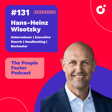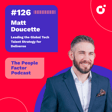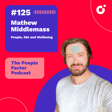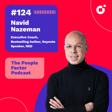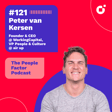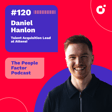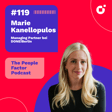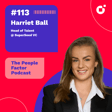Introduction and Recruitment Challenges Recap
00:00:08
Speaker
Hello again. hey Hi. So last time after we finished the episode, we had an amazing conversation about recruitment and all the challenges and the things that we go through.
00:00:21
Speaker
So this is why we're talking it again today. And I'm really excited about it because I feel like we're going to talk about the real deal today. And yeah, I think maybe you can start off by...
Empathy and Relationship-Building Shift
00:00:35
Speaker
giving your view on what recruitment is today and how you view it compared to the past. Well, I think recruitment today is all about empathy.
00:00:49
Speaker
When I initially started sitting recruitment hours baptized in into the function of a small agency recruitment sourcer.
00:01:00
Speaker
within a boutique agency recruitment um space which is pretty cool but I was very much taught the formula of how you source, how you build relationships, how you negotiate and I'm still grateful to this day for this team and the people that um taught me so much because it's been my foundation and my DNA as a recruiter and I think this is what makes me successful today because they were so good.
00:01:28
Speaker
I'm going to give them a shout shout out, Moriarty Media. there was so yeah relationship They were building. They were so good at not spending money, but actually spending their time effectively with what's important.
00:01:40
Speaker
Number one, relationship building. And number two, um truly understanding what the candidates want, need, need. and how you can connect that with your clients or clients you don't have.
Recruitment Changes Post-COVID and AI Impact
00:01:52
Speaker
So that kind of stayed in my DNA as a recruiter. But in our day and age, things have shifted dramatically. I've got over 10 years of experience now, and I'm a mixed bag between agency recruitment and in-house.
00:02:05
Speaker
And I genuinely see such a shift since COVID and since AI stepped into the scene. And that's been fun. i think there's been empowering on so many fronts, but at the same time, and that just meant a lot more work for us recruiters.
00:02:22
Speaker
yeah I don't know. How do you feel ah about it? Yeah, I think you touched on really good points. I also see a complete shift, actually. i feel it's way more focused on empathy, way more focused on the human side, because this is now how you grab people's attention, how you really win candidates over.
00:02:44
Speaker
so I think before it was way more, not everywhere or like not in every market, but in, it was way more an employer driven market. So I felt like it was more procedural, more like, yeah, okay, we need, to we need someone let's interview, you know, and then it's like different numbers. And then whoever performed the best ah was the one who got hired.
00:03:08
Speaker
Whereas is now it's, like shifted completely to hiring for potential and hiring for a cultural fit and also being okay with, you know, hiring someone who's maybe not as experienced, but brings in the motivation and and the right attributes to be great down the line, you know, two years later or something.
Digitalization and AI in Recruitment
00:03:29
Speaker
So I think that has changed a lot. And then also the the process itself, and I'm just taking this from my perspective, own way of working or like being on the side or like on the, on the talent or recruiter side is that I'm now back to back to back in interviews.
00:03:47
Speaker
And that is because everything is digitally now, you know, you, you don't have people coming into the office, picking them up from reception and then having like two hours spent with them and, um, yeah, just bringing in different people, coffee or whatever, you know, like those things.
00:04:05
Speaker
are not happening as much anymore. And before, I remember when I was interviewing like but for my first jobs, I had to go in for every step into the office and meet everyone face-to-face. And it was hours and hours of interviewing compared with you know going there, being there, the aftermath.
00:04:24
Speaker
And now everything is so quick and it's like it feels long but when you say you have five steps, six steps, seven steps, but actually it's way shorter because It's all online, so you don't have the commute anymore or the overtime when you talk too much you know after an hour latest.
00:04:46
Speaker
You have to go to the next meeting, so there's not much time to do all those things, and which I think have really shifted it.
Balancing Technology and Human Element
00:04:52
Speaker
and then As you mentioned as well, I think the third biggest point for me is also AI, as you said, you know, you sometimes don't know anymore who really selects your profile or your CV and then it goes through and different systems and softwares.
00:05:08
Speaker
And then and you have now AI that really chooses the most relevant profile and and then From which point onwards is I'm really the human there, you know?
00:05:20
Speaker
m so And before it was way more manual. I mean, we still go through 500 CVs every day, you know, like me every day, maybe not anymore, but and you do do that on a weekly basis.
00:05:36
Speaker
But I think it has become way more automatic, a lot of technology and yeah, very digital. I agree with that.
00:05:49
Speaker
I do also um second what you say that it's um really back to back. It is very energy consuming. personally don't know how to do an interview without investing myself into it fully. I want to understand what is happening with this person's life, dreams, professional inspirations, how otherwise I could truly understand their motivation.
00:06:16
Speaker
um So it's a mix of satisfying the stakeholders, the hiring teams and understanding the why on technical side and, you know, skillset, abilities, but also understanding, you know, the human element of it.
00:06:29
Speaker
And I think this is why I think That's never going to change for a recruiter. Hiring is still deeply human, building trust, managing expectations, and finding alignment between candidate and our company and team is still at the heart of the recruiter's role.
Resource Limitations and Creative Solutions
00:06:46
Speaker
Now, it really depends what the scope of the brand is. Is it with an amazing brand presence and employer branding or is it the opposite? Because this equally is going to be a great challenge for the recruiter.
00:07:00
Speaker
It's not easy if you have to go through 600 CVs that just arrived on a Monday since you posted around Friday. Then it's not easy to go through thousands and thousands of LinkedIn profiles.
00:07:13
Speaker
um And sometimes you don't even have that resource. um I know even from personal experience, you can't actually use LinkedIn recruiter. What do you do then? What if you don't have the budget? So it's a role where it requires so many different skills where you need to be creative, you need to be in good communication with the internal and external teams, with candidates, um and that could make or break the whole process.
00:07:40
Speaker
But yeah, I think time and energy consuming for sure. Long behold, I've forgotten the days where we would go for lunch with a candidate. I think even now you can place someone, change continents with them, relocate their whole family and they still don't even know you exist.
Remote vs. In-Person Recruitment Preferences
00:07:57
Speaker
um yes If you get an invitation for a coffee or lunch, you kind of go, oh, wow. Wow. Okay, that's cool. I don't know. was yeah um What's that to do with people? Do you think it's my unique experience or you think candidates very much show their appreciation?
00:08:12
Speaker
No, i think you know what? I think it's mixed. It really depends, I think, on the role and also maybe even the different departments, you know, I think engineering is very different to sales and then marketing is very different. So I feel like there's different appreciations for different steps.
00:08:30
Speaker
I feel like, and I don't want generalize here, but I feel engineers appreciate way more a remote setting and a remote and process, whereas maybe someone in HR or someone in sales would appreciate more like the face-to-face, you know? So I think it, and again, not generalizing, but I guess 90% it's like that.
00:08:51
Speaker
So I think it, it, it differs. Um, but I do think, you know, when you were just saying, you know, all those different challenges, I think what happens a lot is the, like what people don't realize is that we juggle so many different people and so many different stakeholders at one given time, you know, that's,
00:09:14
Speaker
this invitation to a lunch or you know like you're trying to show the empathy or communicate everything sometimes can really go under and um obviously our goal is to give 100% right with each candidate um whether you continue with them throughout the process and you hire them or you know it's just the first conversation and it might not happen now but it might happen later you never know um but I think it's really underrated the um amount of different stakeholder points we have on a daily basis.
00:09:49
Speaker
And I think if you openly explain that or or communicate that to candidates, they really do appreciate it way more, whether you do have those you know face-to-face and gatherings or not.
00:10:05
Speaker
um So I think it's all about communication and and really Yeah, just being open and transparent and and just, you know, if you don't have a budget for something to just really say it.
Establishing Non-Negotiables and Communication
00:10:16
Speaker
If you do offer it, then, you know, to go for it. But then also not apply or like not kind of force people to do things that they don't want to do or they don't feel comfortable with.
00:10:28
Speaker
ah Because I think and now with the option to be remote and do things maybe, um you know, in ah in a more comfortable and setting, I think you have to give people you know, the option to choose and um to bring out the best in their comfort zone.
00:10:46
Speaker
Bring out them in the best way in their comfort zone. Yeah. I think... Yeah, so... Sorry. No, you go, you go. think it's about your non-negotiables, especially when you said remote, not remote. This is a shift we noticed since COVID especially.
00:11:02
Speaker
a we as as recruiters from from that time, before and after I would say, I experienced a massive shift and I would say the roller coaster of it because um it was no hiring, then it was mass layoffs, especially in the tech industry.
00:11:17
Speaker
And you went from um fighting over the same talent pool, then all of a sudden things really shifted. Candidates had a lot more ownership over the process.
00:11:28
Speaker
They got a lot better, in my experience, at interviewing, at getting prepared, at knowing um what their non-negotiables are once you have kids. I mean, even the baby boom after COVID um that somewhat affected me personally.
00:11:45
Speaker
i But at the same time, it's kind of like, you need to know your non-negotiables as a recruiter, but also as a candidate. um Because as much as you may want to work remotely as an employee, the company may not be offering that.
00:11:59
Speaker
um But it is something that now is widely available. um So I quite like that you you gave this example and often, um You know, we reach out to candidates to to openly communicate these things from the get go. You know, you know what you can't change with the stakeholder and what is moldable.
00:12:16
Speaker
um So we're very, especially when we're more experienced, we're very quick at suggesting ideas and seeing how we can influence the process so we can then preempt the offer stages in in the best favor of the business and the candidate.
Feedback Challenges and Candidate Experience
00:12:30
Speaker
But ultimately there are non-negotiables and I think it's about aligning that very early on. And i I want to touch base with you on the feedback piece because I've had i had very different experiences here.
00:12:46
Speaker
So ah once I called a candidate who I knew was going to be a no, the hiring manager just let me know straightway after the interview. But I did consider that he had a big gap on his CV and from the way he was coming across in a screening call, I ah just felt that he would appreciate the personal touch rather than a cold email.
00:13:06
Speaker
So I gave him a call and he nearly teared up and said, nobody does that. Now, openly speaking, I cannot do that for 600 candidates per headcount over the span of three days.
00:13:18
Speaker
So I don't do that for everyone. But again, I just listened to my recruitment hunch there and even just ah my, my, my person, you know, intuition there. And I just went, okay, I need to do this for him, but i can't do that for everybody. And then I had another case where, um, I did everything in my power to contact this candidate. It was almost like a two hours chase on multiple platforms because there were sorts of technical errors to give him some feedback from his technical assessment.
00:13:48
Speaker
And um he knew that this was happening because they were all on his side, the challenges to connect with him. And I'm giving him this 20 minutes feedback, looking forward to empowering his career and, you know, making his next interview a lot better.
00:14:06
Speaker
And then he sends me an email, do you mind sending that in writing? Oh, yeah, I had one of those too. Wasn't it enough that I spent so much time trying to give you that?
00:14:19
Speaker
you know and then And then there are other candidates where you really, really do your best to be on top of your admin. And then I yesterday see some sort of frustration vibe in one of my emails and I go, but who is this person? Do I remember that name at all? And I'm not saying that I have this phenomenal elephant memory.
00:14:35
Speaker
But um yeah, I couldn't find his name even on the system and then I realized, oh, wow, this email matches so-and-so's email. He has first and second name completely different on his email than on his CV.
00:14:47
Speaker
So I just wonder, do you think candidates understand what it means for us to um to legal well communicate with them effectively?
00:14:59
Speaker
Yeah, so I don't think, and actually when I got into this role, I thought, you know, this is what you learn, right? Everyone needs feedback and everyone wants it. So it is a one size fits all approach, but it's not. This is what I learned, you know, in in my, yeah, almost nine years now.
00:15:18
Speaker
I definitely don't think it is ah generalized, and wanted way of working with someone, you know, and in a process. I don't think everyone is open for it.
00:15:32
Speaker
i think it feeds also into the fact that, you know, people do get frustrated if they have been looking for a while for jobs and, you know, they just don't want to know anymore. They just want a yes or no and that's it. And then you have other people who really chase you for feedback, right? So what I have now implemented for myself, and I think it works quite well, is I communicate everything very clearly from the from the first conversation I have. When I get to speak to someone,
00:15:57
Speaker
is I tell them straight away um if I, you know, know that they will continue or m like, obviously I'm usually not always know if they're going to continue straight away after my conversation, but I always say to them, if it's going to go further, you will...
00:16:14
Speaker
you know, be invited. And if it's not going further, then you will receive a very boring email um or like a generalized email that it is a no, because we only give feedback after the second, usually the second stage.
00:16:27
Speaker
Because I think after, you know, minimum, when someone has spoken to a department, um ah interviewer, then they should receive some sort of feedback. And I think that's fair, but not when they come to me because it's so like I literally, you know, out of so many candidates you pick, I don't know, let's let's say out of hundred candidates, I pick 20.
00:16:47
Speaker
I cannot possibly call every person, you know, for this one role and um give them detailed feedback after the first conversation. But after the second, because we receive feedback, I think that's doable. So then I do take the time. I try to call them once, two, three times. If I don't reach them, I send an email.
00:17:03
Speaker
And then I say, you know, that this has been um and an unfortunate no. And if they want to have feedback, they can book themselves in. And then I give them my link, you know, in the email. And people some people do, but I'm telling you 95% don't.
00:17:19
Speaker
They do not want to have feedback. Yeah. I know. and And then there are other people where, you know, they come and I had this as well a couple of months ago, actually, where someone was like in the final and then I called them when it was a no.
00:17:35
Speaker
And then they were like, yeah, yeah well, you could have just sent me an email to tell me it's a no. You know, and i was like, okay, you know, for finalists, we usually do put more effort in because you invested time. So I kind of explained to him, but I think he was so frustrated that he just didn't care.
00:17:51
Speaker
You know, he just wanted to to know the answer. And that's also fine. I think not everyone can deal with negative feedback. So it's down to them, but obviously we try our best to give the best candidate experience as
Managing Communication Volume and Strategies
00:18:05
Speaker
recruiters. so I think us trying is already enough.
00:18:08
Speaker
Um, But yeah, you you can't please everyone in this job. I think this is something you learned a hard way, know, with different yeah examples.
00:18:20
Speaker
And do you ever feel and that you also have people who really want the feedback and then you give it to them and then all they do is just argue with you? Did that ever happen to you? shouldn't ask me that question.
00:18:39
Speaker
Yes. Yeah. I think this is such a great question because at some point, because you speak to so many people without realizing you almost profile the type of personality you're dealing with from the first five, 10 minutes of the interview. And this is where you have to be super switched on with evaluating your own biases because at the end of the we need to deliver a great quality information.
00:19:02
Speaker
and focus on that over anything. and We've got to be data driven. So this is where you can be very pragmatic and switch off from that mindset. But you still pick up on what type of personality you're dealing with.
00:19:15
Speaker
um and And that should not affect our DEI hires, right? Um, so it's so difficult to switch stuff because it's almost like you have this refined frequency now in yourself.
00:19:27
Speaker
Uh, you can work this muscle and you know how to flex it. I can tell which are going to be the troublemakers. I'm going to call them like that from the very beginning. And I almost, I'd almost anticipate what's going to happen next.
00:19:41
Speaker
And it's always 99.9% accurately assessed from myself. sense accurately assessed from myself ah in the interview process. These are the people that keep on asking for more and more and more and more and more and they naturally don't progress much in the interview process because I think their focus is just not in the right place. um Yeah.
00:20:01
Speaker
I think if candidates are a bit more fixated on their end goal to secure the role that they really want, then they see the recruiter as a partner rather than a gatekeeper. And once you get that energy from someone in a conversation where they speak to a bit more like you are um the gatekeeper, then it's it's quite clear that they're not, um you know, with their eye on the ball.
00:20:26
Speaker
that make sense? At least to me. yeah. but yeah I totally agree. I don't think there are that many. um they they ah I agree. I think like honestly 90%, 95% people really happy and that they have received feedback and you know, they appreciate it, especially if it's over the phone.
00:20:48
Speaker
um And I had even like this, no, sorry, last week I had two people who actually booked in a video call with me, you know, because they really wanted to get further feedback. And I really appreciate that as well. I think it's a great trait to have to like wanting to improve yourself and,
00:21:06
Speaker
you know I think there are no better people than us to to be able to help them to do so. right But I think it's also difficult. And again, this is something that people don't see. You know you see yourself as that one person who has applied for this role and um you know and and and it's almost like you think you're the only one or obviously everyone goes in with some sort of an intention right into a process.
00:21:29
Speaker
But we on the other side deal with 10 other people like you, um you know, and and everyone is different and everyone has different skills and everyone has a different process. and And so you kind of have to constantly as a recruiter really adjust to the person and and really get down again into their world or get into their world, you know.
00:21:52
Speaker
And um so I think it is way more um how can I say, tailored work if you want to do the job well, right?
00:22:04
Speaker
um And you actually think, especially if you really want to treat people like a human rather than a number. And it's actually funny because I, um you know, I did a post once and I really want to mention this and I would love to have your take on this.
00:22:21
Speaker
and I did a post once and I said, I do not reply to every message I receive or every email. because it's impossible for me to do that. And I was just very honest, right?
00:22:32
Speaker
And um I posted this on LinkedIn and said, like, I just don't, like, I can't do it. And it's a numbers game, right? Like, if you message me and I don't reply, you message 10 other people and one of them will reply. This is how it goes. This also goes for me. This goes for you when you reach out to candidates, you know, right? That's for everyone.
00:22:49
Speaker
And I was just honest and said it. And the backlash I got on the comment section for this was like, oh my God, you you know, what kind of a recruiter are you? You shouldn't have, you know, and this is not the goal of our job and whatever, whatever.
00:23:03
Speaker
Which was, you know, fair, but I was just honest. But then the amount of messages i got privately sent. where people were messaging me from talent or recruitment and were like, oh my God, I'm literally the same. Thank you for saying this. ah That makes me feel better.
00:23:19
Speaker
Or like, you know, saying even, hey, thank you for just being honest. and You know, I would not be able to say this out loud, but it's so true. Like, you know, like it was, it was even like a joke in in a way, but it's
Work-Life Balance and Self-Care in Recruitment
00:23:31
Speaker
the truth, right? Like you cannot ever finish all your to-dos on a list on a daily basis with this job because there's, you know, especially when you constantly tailor the feedbacks and the conversations with stakeholders like hiring managers, founders, and then HR and the candidate, then, you know, you just never get to it.
00:23:54
Speaker
So how do you feel about this? Like, is it true? Do you do you think I'm exaggerating? ah Or do you feel like you you can reply to everyone on LinkedIn, on email, on Slack, on on everything?
00:24:11
Speaker
To be honest, I've been trying multiple things in my day to day to be able to address this um because I do really believe in honing that human element. And I genuinely feel for these people and who don't want to lose that.
00:24:25
Speaker
And there's only one way to be okay with not responding to them is just to shut that off. Right. But I don't want to you lose that because it helps me to do my job well. And it helps me to be a good, like the person that I want to be and the mom that I want to be.
00:24:38
Speaker
um So I've tried various things. No, it's impossible to get back to everybody exactly when they're messaging you, especially if it's that one person that You send them an email, you send them one message and they keep on sending you multiple and it almost zaps your energy that it's already on a low because we're in back-to-back interviews, as you said, with the shift from COVID and AI and remote, hybrid, global, international hiring.
00:25:05
Speaker
We're in back-to-back interviews, guys. Yeah. Gals, everybody, means we're talking to you on one-to-one basis and we have our day-to-day job.
00:25:16
Speaker
We'll have our internal, external meetings. We have events. We then need to have a coffee break or God knows, maybe eat food, go to the toilet. We're still people, right? Yeah.
00:25:29
Speaker
am So then we want to compile all the data we have, go through it, make sure we make a good decision so we don't disqualify somebody ah when we shouldn't. and It takes a lot of, um you know, switching between different skills and I would say preserving your energy.
00:25:47
Speaker
um What I do now is I try to switch channels, for example, to help myself. um I pick the candidates who want to give them a personal call. For professional, personal reasons. So when I interview them, i I, let's say, find out a detail about them, which makes me more motivated. And that's not fair, but it's because I am considering something.
00:26:09
Speaker
Maybe they had a CV gap. Maybe maybe i invested myself into the process and I gave them some... Um, interview coaching advice, whether they progress or not. I invested myself a little bit further than maybe what the average recruiter would.
00:26:23
Speaker
Um, but that doesn't mean I don't want to get back to the rest of my candidates. I would, it might be a bit more generic. So for example, the headfunding projects, I messaged 208 people. I can't possibly send them exactly the same message. Obviously, was a template.
00:26:39
Speaker
um And then they get back to me. Well, I would love to have a very customized approach, but it's not possible. So again, I had a template and I just t took a word here and there.
00:26:51
Speaker
And I love someone in our leadership from from the company work for, she said, an update is better than no update.
00:27:03
Speaker
Well, something's got to give. I'm not going to be able to give them the email that I'm completely happy with or, um you know, the personal touch I'm completely okay with, but at least I can give them an update.
00:27:15
Speaker
um And i'm I'm not always going to succeed, but I can try and I can keep on trying. um Exactly. And what I've noticed for myself is that when I do it right away, all the way with my best attitude,
00:27:29
Speaker
then it's better ah executed rather than having to come back to a pile of procrastination because then you have to fight with it. You still made the decision to not get back to them, right? So it's not ah and it's not the that you're dealing with decision fatigue.
00:27:44
Speaker
or you're not knowing what to say, we still we still decide not to get back to them. um But then it's a choice. Why did you decide to do that? So, yeah, suppose it's about managing your own energy and and and qualifying for yourself what's more important. um so But I really find it difficult to have to come back to hundreds of emails or messages on LinkedIn.
00:28:06
Speaker
So I have my moments where I just go through bulk. um And then I know my personal communication is suffering. So I didn't get back to all my WhatsApps and all my girlfriends.
00:28:18
Speaker
But my social battery is gone. and they yeah you know yeah they know that. They know that I will get back to them eventually. But yeah, like I said, something's got to give. There's got to be compromise.
00:28:32
Speaker
Oh, 100%. I think I love my job. I really love doing what I do. But this job has really made me... antisocial because by the end of the day, I do not want to talk to anybody anymore.
00:28:43
Speaker
I hate being on my phone. I always hated it to be fair, but now I just like it even more. I don't want to see any messages, any like no calls, just, you know, want to do things where I don't have to use and my mouth and talk to anyone or, you know, my brain to, to think and, you know, what to say, what to do, nothing. I just want to chill and, and do something in the house or whatever that just relaxes me. Like this is literally how it is for me.
00:29:10
Speaker
Um, so yeah, I, I do think that, you know, that as you said, something has to give and, um, yeah, you, you can never please everybody. And this is something that it took me really long to, to get to that because in the beginning I really wanted to do everything hundred percent right.
00:29:26
Speaker
And, you know, just, and, and I have always this approach. I really want to, to, treat everybody the way I want to be treated if I'm in the process, because I have also had times where I was you know struggling to find a job during COVID, for example.
00:29:39
Speaker
So it it was difficult and I can really relate to you know people who are actively looking and they really need to find something to to provide for their families and all of those. Of course, I do understand.
00:29:51
Speaker
But the thing is, from our perspective, again, you know, we are not just dealing with one person with so many and everyone has their own situation going on. And the fact that we are dealing with humans, there's constantly something changing, right?
00:30:06
Speaker
People have emotions, they have situations, they have their own mind and decisions to make. And then it doesn't just affect them, but then they have to also talk to their wives or husbands if they want to relocate or, you know, their their kids or, you know, childcare and all these things that we also deal with, right? like And this shouldn't sound like we're complaining or anything, but when I do put someone in a process and I bring them through it, I have to also deal with all of those things that they are dealing with. You know, like you have to dig into their world and understand what they need, what they want.
00:30:40
Speaker
and then translate all of that to the hiring team and make it happen. And, you know, so it is a lot, right, going on and at once. And I think it's just a simple rule. And I have literally and i am a um little note next to my ah screen and i and it just says,
00:31:01
Speaker
Your 100% doesn't have to be everyone's 100%, you know? And this is literally what
Importance of Human Relationships and Balance
00:31:08
Speaker
I tell myself. Like I try my best, but it might not be enough for everybody.
00:31:13
Speaker
And yeah, that's really my take. So my last question and would be what's your way of, you know, bringing yourself through those challenges or difficulties to manage it all?
00:31:32
Speaker
Honing on what's important in the job, I would say most importantly is that relationship built peace and the human element. Um, and this was going to keep us working before robots and AI take over the world. Yeah.
00:31:48
Speaker
no I don't think we're actually um going to be endangered from that perspective. Just joking. But this is where I kind of have grace for myself and I have grace for my team um that I work with and the candidates.
00:32:04
Speaker
So if the candidate didn't perform very well, I tried to find out in that interview why. And then it turned out he had a two months old baby and I could see it on his face and he's just an invested father.
00:32:15
Speaker
And I very well know what this means. So then I gave him immediate feedback And I said to him, can you try and implement it? He actually was so brilliant at that, but I still rejected him because I have to be fair for the team and for the rest of the candidates who, you know, considered this ahead of the interview. I'm not i'm not saying that there weren't any other candidates, you know, with little babies.
00:32:41
Speaker
Or they were overly tired because they were caring for their ill mother, etc. Or whatever the reason may be. Point being, we have to be fair. And it's really difficult because we have to make these tough decisions.
00:32:52
Speaker
And of course, I want to help this father because my husband's been in that position I was. But this is a positive bias. So honing on that element, number one, with the human touch and empathy. But then be on top of your biases and make sure they don't come in the way of quality and how you deliver for your family.
00:33:09
Speaker
team, company, brand, et cetera. and And then you just go into the formula of the process and your personal process within the process, how you communicate with candidates, how you communicate with your stakeholders. um Because at the end of the day,
00:33:25
Speaker
um You've got to manage it. So I have kids, which means that times in the day before they go to sleep, I will not join a meeting and that's it. I don't care who you are.
00:33:37
Speaker
I'm not joining that meeting because I want to spend my one-to-one time with my children. Because this is why I work, and so that I can provide lifestyle for them. um But then they go to sleep and I pick up the laptop and sometimes I work really late.
00:33:51
Speaker
Nobody's asking me to. No one is promoting that lifestyle. It's my personal choice and it's something I've agreed to do with you know my husband. um So sometimes I go through CVs really late, past 7 p.m.
00:34:05
Speaker
I send the emails. And... I am embarrassed that some of the candidates will receive them this late. Try to schedule them, but at the end of the day, something's got to give and you just have to manage it in a way that works for for your team, company, client that you service and also for for the person on the other side and yourself.
Conclusion and Appreciation
00:34:25
Speaker
Yeah, totally agree. Great. Thank you so much, Milena. It was lovely as always. And I think we have like endless conversations about these topics, but yeah, it was lovely. So thank you so much.
00:34:37
Speaker
for your time again. Thank you for having me again. course.


